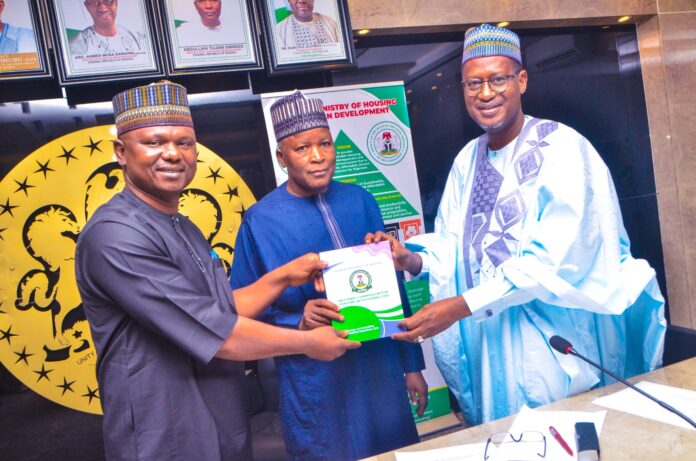In a significant move towards ensuring accessible and affordable housing for Persons with Disabilities (PWDs) across Nigeria, the National Commission for Persons with Disabilities (NCPWD) has taken a proactive step by presenting the Accessibility Regulations to the Federal Ministry of Housing and Urban Development. The presentation, led by the Executive Secretary of NCPWD, Dr. James David Lalu, was made to the Honourable Minister, Architect Ahmed Musa Dangiwa, in a ceremony held recently in Abuja.
Dr. Lalu, known for his steadfast advocacy for inclusive policies, underscored the crucial need for adherence to the Accessibility Regulations (AR) in the construction of public buildings. He expressed the Commission’s commitment to not only advocating for accessible housing but also ensuring that these structures are built according to international standards. This initiative, he noted, is part of the Commission’s broader mission to improve the quality of life for the estimated 35 million Nigerians living with disabilities.
In his address, Dr. Lalu pointed out the alarming reality that many public buildings in Nigeria currently fail to meet the necessary building codes outlined in the AR. These codes include specific prescriptions and measurements detailed in structural engineering documents, which are essential for creating spaces that are accessible to all. He emphasized the importance of incorporating these parameters in the design and construction of public facilities, stating, “As the Federal Government embarks on building houses for its citizens, the Accessibility Regulations will ensure that these designs are globally acceptable and inclusive.”
Dr. Lalu also highlighted the role of the current administration under President Bola Ahmed Tinubu in promoting inclusive governance. He expressed optimism that the “Renewed Hope” schemes would bring tangible benefits to PWDs, offering them the opportunity to enjoy the dividends of democracy fully. The Executive Secretary’s remarks reflect a broader vision for a more inclusive Nigeria, where everyone, regardless of their physical abilities, can access public services and infrastructure.
The Honourable Minister of Housing and Urban Development, Architect Ahmed Musa Dangiwa, lauded the Commission’s efforts during his keynote address. He acknowledged the NCPWD’s dedication to representing the interests of over 35 million Nigerians with disabilities and reaffirmed the Ministry’s commitment to inclusive housing policies. Dangiwa stressed the importance of adhering to the Discrimination Against Persons With Disabilities (Prohibition) Act of 2018, specifically Sections 3, 4, 5, and 7, which clearly outline the requirements for constructing public facilities. These sections mandate that all new public buildings must be accessible to persons with disabilities from the foundation to the finish.
The Minister also outlined various government schemes designed to make homeownership more accessible to all Nigerians, including PWDs. Among these initiatives are the “Rent to Own” program, which allows individuals to pay for their homes through monthly subscriptions, and an outright purchase option. He emphasized that housing is a fundamental right of every citizen and should not be denied to anyone based on their physical abilities.
The Minister assured the gathering that the “Renewed Hope” estates project aims to provide homes across all 774 local governments in Nigeria’s six geopolitical zones. This ambitious initiative reflects the government’s commitment to addressing the housing needs of all citizens, particularly those with disabilities. The project, Dangiwa noted, is a critical step towards fulfilling the government’s promise of providing inclusive and accessible housing solutions.
The event was attended by other key figures, including the Honorable Minister of State for Housing and Urban Development, Hon. Abdullahi Tijani Mohammed Gwarzo, the Permanent Secretary, Dr. Marcus Olaniyi Ogunbiyi, and several Directors from both the Ministry and the Commission. Their presence underscored the importance of this collaboration between the NCPWD and the Housing Ministry, highlighting a shared commitment to fostering an inclusive society.
The presentation of the Accessibility Regulations marks a pivotal moment in the ongoing efforts to ensure that all public buildings in Nigeria are accessible to PWDs. As the country continues to develop, such initiatives are crucial in promoting inclusivity and equity. The NCPWD’s proactive stance, coupled with the Ministry’s commitment, offers hope for a future where all Nigerians, regardless of their abilities, can enjoy equal access to public facilities and services.
In conclusion, the NCPWD’s presentation of the Accessibility Regulations to the Housing Ministry is a commendable effort towards achieving inclusive housing in Nigeria. It reflects a broader commitment to ensuring that the rights of PWDs are protected and that they are provided with the necessary infrastructure to live independently and with dignity. As the country moves forward, the collaboration between the NCPWD and the Ministry of Housing and Urban Development will be instrumental in shaping a more inclusive and accessible Nigeria for all.


